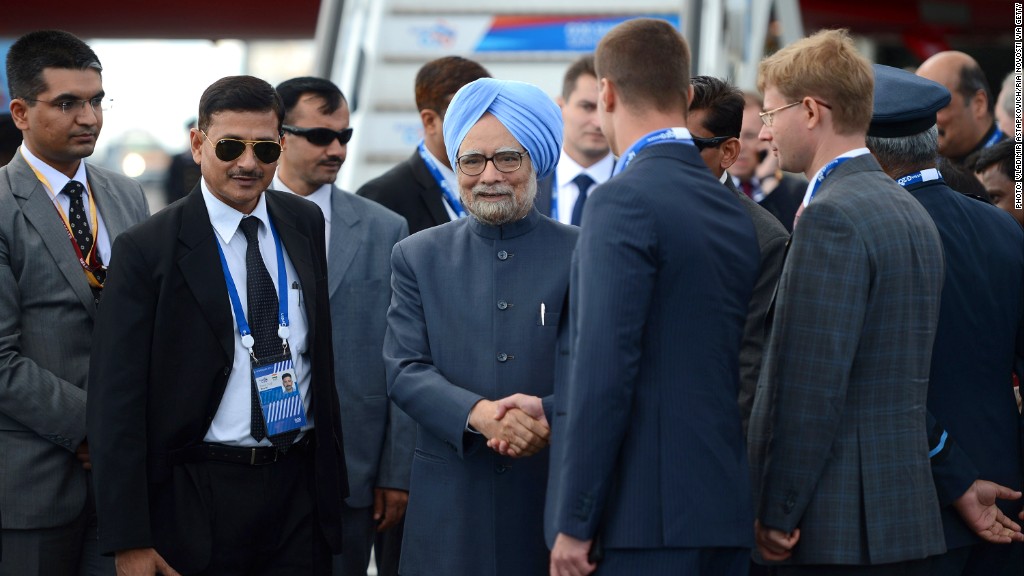
The world's biggest emerging markets pledged Friday to create a $100 billion fund to help protect their economies from shocks as G20 leaders warned that the global recovery was still at risk from volatile capital flows.
According to the agreement announced at the meeting of G20 leaders in Russia, China will contribute $41 billion to the fund. Brazil, Russia and India will provide $18 billion each while new BRIC member South Africa will pay $5 billion.
The fund -- dubbed the Contingent Reserve Arrangement -- is designed to provide member countries with an emergency cushion of cash during times of crisis. Its creation reflects frustration in emerging markets at a lack of influence over institutions such as the International Monetary Fund despite their growing importance in the world economy.
Jim O'Neill, a former Goldman Sachs economist who coined the "BRIC" acronym, called the $100 billion fund "an encouraging, interesting development" that could help emerging markets "take more responsibility" for themselves on the international economic stage.
"To reduce the vulnerability of these countries and others, they've got to develop their own funding sources and their own currencies in a spectacular way," O'Neill told CNN.
The effort comes as certain emerging markets, including India, Indonesia, Turkey and Brazil, have come under economic stress as money that had been pulsing through their economies begins to dry up.
Developing nations that rely heavily on foreign capital -- those with large current account deficits -- have suffered the worst.
The money began flowing out of these countries and moving back to developed markets ever since Federal Reserve chairman Ben Bernanke warned in May that the Fed planned to cut back on its stimulus programs, which had been flooding the world with cheap money.
The Fed announcement spooked market players around the globe, resulting in capital flowing back to perceived safe haven assets and the U.S., where the economy has been improving and the dollar strengthening.
Related: The global recovery is no sure thing
In their closing statement, G20 leaders said the recovery was still too weak. They cited the market volatility linked to expectations that the Fed and other central banks will begin choking off the flow of cheap money.
"We agreed that it remains critical for G20 countries to focus all our joint efforts on engineering a durable exit from the longest and most protracted crisis in modern history," they said.
"Our central banks have committed that future changes to monetary policy settings will continue to be carefully calibrated and clearly communicated."
President Obama said developing economies recognized that a strong U.S. economy was good for them too, but he acknowledged the challenges some countries face.
"We need to make sure that we are working with them in managing this process," he said. "And I'm pleased that over the past two days we reached a consensus on how to proceed. We agreed that our focus needs to be on creating jobs and growth that put people back to work."
But some emerging market leaders feel they have been left in the dust as they contend with devaluing currencies, rattled stock markets, increasing borrowing costs and the threat of slower economic growth.
The Organisation for Economic Co-operation and Development has even warned that a global recovery could be "derailed" by an emerging market slowdown.
Ahead of the G20 conference, Indian Prime Minister Manmahon Singh stressed the importance of developed nations taking an orderly, measured approach when pulling back on their monetary stimulus programs.
"Though there are encouraging signs of growth in industrialized countries, there is also a slowdown in emerging economies," he said, stressing that an orderly retreat from stimulus measures would cushion the blow to the developing world.
Related: Are emerging market woes contained?
But a coordinated effort may not be in the best interests of the central bankers who set monetary policies.
"Central bankers are there to support their domestic economies, they're not meant to focus on the economies of other countries," explained David Lebovitz, a global markets strategist at J.P. Morgan Asset Management. "I would be surprised if we saw a global coordinated central bank effort. But I wouldn't be surprised if I saw them talking more and having more conversations about the implications of their policies. I think a bit more global conversation would be positive."
Pope Francis even weighed in on the economic situation this week, issuing a public letter to the G20 host -- Russian President Vladimir Putin -- urging him to continue developing "a global financial framework with its own just and clear rules ... to achieve a more equitable and fraternal world." However, Francis did not outline any holy guidance for central bankers.
-- Charles Riley and Mark Thompson contributed to this article.


